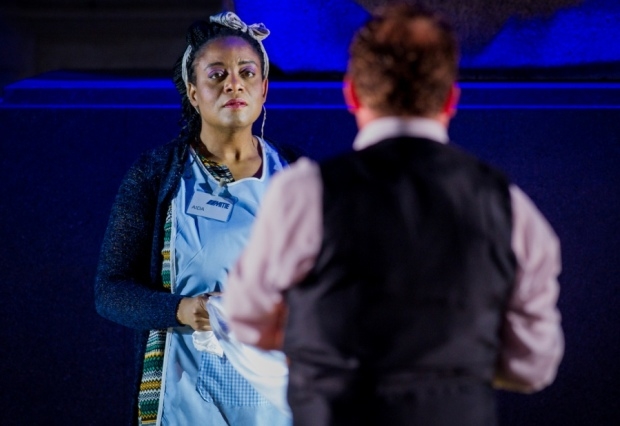Aida (Holland Park)

© Robert Workman
I’ve been trying to imagine director Daniel Slater‘s initial pitch. ‘Wolf of Wall Street in a museum’ – something like that? He must have been very persuasive for OHP to green-light his vision of Verdi’s dignified grand opera as an after-hours orgy in the Egypt gallery, where banker types snort coke and are mean to Ada – sorry, Aida – the cleaning lady.
Aida has one of Verdi’s elaborate where-do-I-start plots, an epic tale of Egyptians vs Ethiopians that’s replete with set pieces and grand choral marches, yet deep down is just another love triangle. And in that contrast of scales, the public and the private, lies its essence. Belittle it, as Slater does, and the edifice collapses. His concept miniaturises the story and leaves the singers floundering.
Take Amneris, the Egyptian princess who ends up in the thwarted corner. Imperious and unsympathetic in the early scenes, by act four her revulsion at Radamès’s threatened punishment gives her a new complexity. Heather Shipp is excellent in the role, impassioned and committed, but since the director has not earned her tragedy in his cartoonish treatment of her previous appearances we struggle to care.
'Resonantly convincing'
Things are better after the interval, by which time he has given up on his big idea and is content to chug through the rest of the story. Not that it makes any more sense. The idea of a king and his daughter labouring on a museum payroll becomes ever more ridiculous as they plan their escape from the Egyptian army. If someone less resonantly convincing than Jonathan Veira had been singing King Amonasro there might have been chortles.
Gweneth-Ann Jeffers has an attractive soprano but it doesn’t open out very far and her diction isn’t forthright. When she sang her third act aria "Qui Radamès verrà" hunched over, arms folded, her vocal cords seemed to follow suit. Yet by the opera’s tragic conclusion she and the valiant Peter Auty (her heroic Radamès) had their voices where I, and probably they, had hoped they’d be all evening. And light shone. Nothing became the opera like their leaving of it.
It’s a given to say so, but the City of London Sinfonia played the score for all its considerable worth. Manlio Benzi, deservedly one of OHP’s stalwarts, is a superb Verdi conductor and he delivered a majestic account, his brass, horns and percussion erupting like Etna from the open pit. At such times I can wish companies would neutralise a problem show by cutting their losses, putting a few baffles on the stage and treating the audience to a semi-staged performance. It might be less of a draw but there’d be fewer walk-outs.
Speaking of which, where was Daniel Slater at the curtain call? I’m sure there’s a good reason for the evening's fine designer Robert Innes Hopkins to have led the team bows without him, but it looked odd.










